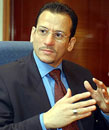 [The leader of the Libyan Islamic Fighting Group, Noman] Benotman surprised his hosts [in Kandahar in the summer of 2000 at a conference of jihadists from around the Arab world] with a bleak assessment of their prospects. “I told them that the jihadist movement had failed. That we had gone from one disaster to another, like in Algeria, because we had not mobilized the people,” recalls Benotman, referring to the Algerian civil war launched by jihadists in the ’90s that left more than 100,000 dead and destroyed whatever local support the militants had once enjoyed. Benotman also told bin Laden that the Al Qaeda leader’s decision to target the United States would only sabotage attempts by groups like Benotman’s to overthrow the secular dictatorships in the Arab world. “We made a clear-cut request for him to stop his campaign against the United States because it was going to lead to nowhere,” Benotman recalls, “but they laughed when I told them that America would attack the whole region if they launched another attack against it.”
[The leader of the Libyan Islamic Fighting Group, Noman] Benotman surprised his hosts [in Kandahar in the summer of 2000 at a conference of jihadists from around the Arab world] with a bleak assessment of their prospects. “I told them that the jihadist movement had failed. That we had gone from one disaster to another, like in Algeria, because we had not mobilized the people,” recalls Benotman, referring to the Algerian civil war launched by jihadists in the ’90s that left more than 100,000 dead and destroyed whatever local support the militants had once enjoyed. Benotman also told bin Laden that the Al Qaeda leader’s decision to target the United States would only sabotage attempts by groups like Benotman’s to overthrow the secular dictatorships in the Arab world. “We made a clear-cut request for him to stop his campaign against the United States because it was going to lead to nowhere,” Benotman recalls, “but they laughed when I told them that America would attack the whole region if they launched another attack against it.”
Benotman says that bin Laden tried to placate him with a promise: “I have one more operation, and after that I will quit”–an apparent reference to September 11. “I can’t call this one back because that would demoralize the whole organization,” Benotman remembers bin Laden saying.
After the attacks, Benotman, now living in London, resigned from the Libyan Islamic Fighting Group, realizing that the United States, in its war on terrorism, would differentiate little between Al Qaeda and his organization.
Benotman, however, did more than just retire. In January 2007, under a veil of secrecy, he flew to Tripoli in a private jet chartered by the Libyan government to try to persuade the imprisoned senior leadership of his former group to enter into peace negotiations with the regime. He was successful. This May, Benotman told us that the two parties could be as little as three months away from an agreement that would see the Libyan Islamic Fighting Group formally end its operations in Libya and denounce Al Qaeda’s global jihad. At that point, the group would also publicly refute recent claims by Al Qaeda that the two organizations had joined forces.
This past November, Benotman went public with his own criticism of Al Qaeda in an open letter to Zawahiri, absorbed and well-received, he says, by the jihadist leaders in Tripoli. In the letter, Benotman recalled his Kandahar warnings and called on Al Qaeda to end all operations in Arab countries and in the West. The citizens of Western countries were blameless and should not be the target of terrorist attacks, argued Benotman, his refined English accent, smart suit, trimmed beard, and easygoing demeanor making it hard to imagine that he was once on the front lines in Afghanistan.
Although Benotman’s public rebuke of Al Qaeda went unnoticed in the United States, it received wide attention in the Arabic press. In repudiating Al Qaeda, Benotman was adding his voice to a rising tide of anger in the Islamic world toward Al Qaeda and its affiliates, whose victims since September 11 have mostly been fellow Muslims. Significantly, he was also joining a larger group of religious scholars, former fighters, and militants who had once had great influence over Al Qaeda’s leaders, and who–alarmed by the targeting of civilians in the West, the senseless killings in Muslim countries, and Al Qaeda’s barbaric tactics in Iraq–have turned against the organization, many just in the past year.
Can Qatar do it again?
Having succeeded in getting erstwhile warring Lebanese factions to get their act together, Qatar is now exploring the prospects of mediating between Fatah and Hamas in the hope of restoring Palestinian national unity.
However, Qatari Emir Sheikh Hamed Bin Khalifa Al-Thani and his influential premier and foreign minister, Sheikh Hamad Bin Jasem, seem to be treading cautiously (some say too cautiously) in the more complicated “Palestinian minefield”.
According to reliable Palestinian sources, Qatar has voiced its “initial willingness” to help “the Palestinian brothers” overcome their differences and re-establish national unity. The same sources were careful, however, to add that Qatari officials — especially Bin Jasem — wouldn’t be in a position to help the Palestinians if they were not willing to help themselves.
U.S. calls a straw poll in Iraq: It may not like the result
In the TV gameshow bubble that substitutes for foreign policy discussion on the U.S. presidential campaign trial, there’s a lot of talk these days about how the U.S. is “winning” in Iraq. The evidence to back this claim is a comparative lull in the death rate in recent months, and the fact that Iraqi government forces are taking more casualties than the Americans. Those proclaiming “victory,” of course, are invariably the same crowd that enthusiastically backed the invasion of Iraq in the first place, and their desire for vindication for their part in authoring what all serious analysts agree has been the most catastrophic strategic blunder in America’s history is all too understandable. (Less understandable is the echo of this position by the Washington Post, which claims the U.S. and the Iraq government are “winning the war” and gaining full control of the country from al-Qaeda and rival militias.)
But the suggestion that a shift or fall in the pattern of violence indicates that the U.S. is “winning” in Iraq betrays the same lack of understanding of dynamics in that country as was so evident in the original decision to invade and occupy Iraq.
Democrats, put down your swords
For Democrats of all persuasions, the conclusion of the primaries should encourage reflection rather than recrimination. Now is the time to listen to the calm counsel that cannot be heard amid the roar of combat, and to think.
Hillary Clinton needs to think about how best to preserve the gains of her campaign without spoiling it all. Barack Obama must consider how best to unite his party while making choices, including a running mate, true to his own instincts and style. Meanwhile their supporters can take deep breaths and try to imagine how they will feel on Nov. 5 if John McCain has won the presidency.
Obama’s Clinton problem surfaces — in GOP ads
Months of bare-knuckled campaign fights, pitched rhetoric and debate jousting produced a treasure chest of sound bites and videos of Clinton ripping Obama as inexperienced, elitist or simply wrong on various issues.
Now that the Democratic primaries are over and Obama has clinched his party’s nomination, the Republicans are ready to pounce.
The Republican National Committee on Wednesday rolled out new ads quoting Clinton criticizing Obama, the first of what likely will be many such ads.
McCain bumbles the delivery
As Democrats buzzed this week about their new de facto nominee, his historic candidacy and the unlikely political demise of Hillary Rodham Clinton, Republican circles were humming with another topic.
The topic: Is there a way John McCain can win the presidency without giving another speech?
That’s overstated, of course, but the concern about McCain’s wooden and stumbling address before a few hundred supporters here Tuesday night – the same evening as Barack Obama’s soaring acceptance address before thousands of screaming fans – has sent something of a shudder through the party and left GOP operatives shaking their heads in dismay.
Adviser says McCain backs Bush wiretaps
A top adviser to Senator John McCain says Mr. McCain believes that President Bush’s program of wiretapping without warrants was lawful, a position that appears to bring him into closer alignment with the sweeping theories of executive authority pushed by the Bush administration legal team.
In a letter posted online by National Review this week, the adviser, Douglas Holtz-Eakin, said Mr. McCain believed that the Constitution gave Mr. Bush the power to authorize the National Security Agency to monitor Americans’ international phone calls and e-mail without warrants, despite a 1978 federal statute that required court oversight of surveillance.
Mr. McCain believes that “neither the administration nor the telecoms need apologize for actions that most people, except for the A.C.L.U. and trial lawyers, understand were constitutional and appropriate in the wake of the attacks on Sept. 11, 2001,” Mr. Holtz-Eakin wrote.
The great divide
Five years after a war allegedly launched to liberate Iraq’s Shiite majority, American forces have been bombing Shiite neighbourhoods in Basra and Baghdad while their snipers and tanks remain on the ground in places like Sadr City.
Iraq seems to have emerged from the worst phase of its civil war, but the victorious Shiite factions have turned their arms on one another in a fight over the spoils, battling for political power in advance of the upcoming provincial elections.
But as the Americans attempt to secure an agreement with the government of Nouri al Maliki to legalise the long-term presence of troops in Iraq, Muqtada al Sadr and his followers remain a formidable obstacle. Whether or not Sadr has been weakened by the clashes in Basra and Sadr City, marginalising the Sadrists will be almost impossible, for they remain the only genuine mass movement in Iraq, with roots that long predate the fall of Saddam.
America’s medicated army
Seven months after Sergeant Christopher LeJeune started scouting Baghdad’s dangerous roads — acting as bait to lure insurgents into the open so his Army unit could kill them — he found himself growing increasingly despondent. “We’d been doing some heavy missions, and things were starting to bother me,” LeJeune says. His unit had been protecting Iraqi police stations targeted by rocket-propelled grenades, hunting down mortars hidden in dark Baghdad basements and cleaning up its own messes. He recalls the order his unit got after a nighttime firefight to roll back out and collect the enemy dead. When LeJeune and his buddies arrived, they discovered that some of the bodies were still alive. “You don’t always know who the bad guys are,” he says. “When you search someone’s house, you have it built up in your mind that these guys are terrorists, but when you go in, there’s little bitty tiny shoes and toys on the floor — things like that started affecting me a lot more than I thought they would.”
Indicted Saudi gets $80 million US contract
The US military has awarded an $80 million contract to a prominent Saudi financier who has been indicted by the US Justice Department. The contract to supply jet fuel to American bases in Afghanistan was awarded to the Attock Refinery Ltd, a Pakistani-based refinery owned by Gaith Pharaon. Pharaon is wanted in connection with his alleged role at the failed Bank of Credit and Commerce International (BCCI), and the CenTrust savings and loan scandal, which cost US tax payers $1.7 billion.
The Saudi businessman was also named in a 2002 French parliamentary report as having links to informal money transfer networks called hawala, known to be used by traders and terrorists, including Al Qaeda.
Interestingly, Pharaon was also an investor in President George W. Bush’s first business venture, Arbusto Energy.
US issues threat to Iraq’s $50bn foreign reserves in military deal
The US is holding hostage some $50bn (£25bn) of Iraq’s money in the Federal Reserve Bank of New York to pressure the Iraqi government into signing an agreement seen by many Iraqis as prolonging the US occupation indefinitely, according to information leaked to The Independent.
US negotiators are using the existence of $20bn in outstanding court judgments against Iraq in the US, to pressure their Iraqi counterparts into accepting the terms of the military deal, details of which were reported for the first time in this newspaper yesterday.
Iraq’s foreign reserves are currently protected by a presidential order giving them immunity from judicial attachment but the US side in the talks has suggested that if the UN mandate, under which the money is held, lapses and is not replaced by the new agreement, then Iraq’s funds would lose this immunity. The cost to Iraq of this happening would be the immediate loss of $20bn. The US is able to threaten Iraq with the loss of 40 per cent of its foreign exchange reserves because Iraq’s independence is still limited by the legacy of UN sanctions and restrictions imposed on Iraq since Saddam Hussein invaded Kuwait in the 1990s. This means that Iraq is still considered a threat to international security and stability under Chapter Seven of the UN charter. The US negotiators say the price of Iraq escaping Chapter Seven is to sign up to a new “strategic alliance” with the United States.
Iran makes the sciences a part of its revolution
Iran’s determination to develop what it says is a nuclear energy program is part of a broader effort to promote technological self-sufficiency and to see Iran recognized as one of the world’s most advanced nations. The country’s leaders, who three decades ago wrested the government away from a ruler they saw as overly dependent on the West, invest heavily in scientific and industrial achievement, but critics say government backing is sometimes erratic, leaving Iran’s technological promise unfulfilled.
Still, Iranian scientists claim breakthroughs in nanotechnology, biological researchers are pushing the boundaries of stem cell research and the country’s car industry produces more cars than anywhere else in the region.
“Iran wants to join the group of countries that want to know about the biggest things, like space,” Richter said to the students during his speech at Sharif University, which draws many of the country’s best students. Every year, 1.5 million young Iranians take a national university entrance exam, or “concours.” Of the 500,000 who pass and are entitled to free higher education, only the top 800 can attend Sharif, considered Iran’s MIT.

 John McCain: I think Israel, in many respects, is stronger economically, their political process shows progress – when there is corruption, they punish people who are corrupt. The economy is booming, they have a robust democracy, to say the least. Bin Laden has not limited his hatred and desire to destroy the United States to the Israeli-Palestinian issue, though Israel is one of the objects of his jihadist attitude. What you’re trying to do is get me to criticize the Bush Administration.
John McCain: I think Israel, in many respects, is stronger economically, their political process shows progress – when there is corruption, they punish people who are corrupt. The economy is booming, they have a robust democracy, to say the least. Bin Laden has not limited his hatred and desire to destroy the United States to the Israeli-Palestinian issue, though Israel is one of the objects of his jihadist attitude. What you’re trying to do is get me to criticize the Bush Administration.
